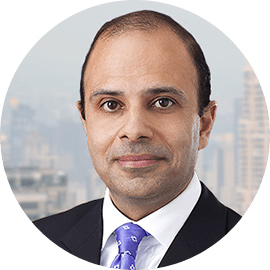Four years ago, Rukhshad Shroff stated that the Banking and Financial Services will be a prime beneficiary of renewed improvements in the credit cycle and recovering consumption because the cost of capital will come down for the sector.
So it is not surprising to note that among JP Morgan Indian Investment Trust’s top 10 holdings, five are from that sector (HDFC, HDFC Bank, Axis Bank, Kotak Mahindra Bank, IndusInd Bank).
His favourite has been, and continues to be, HDFC Bank.
It has been a long term holding for us because it has been growing very rapidly and executing on a well calibrated strategy. Management knows exactly which business segments to participate in, and more importantly, which to avoid. For example, they didn’t go into infrastructure finance but chose to focus on consumer and corporate finance. Because HDFC Bank managed to generate high returns on capital in the course of its growth cycle, it’s become easier for them to raise new capital.
Shroff recently interacted with my colleague from London, James Gard, and explained that banks have struggled in recent years but have started to clean up their act after pressure from the government to reform. Now that the long-awaited repair in the banking sector is truly and well underway, Shroff is as bullish as ever on the sector. He thinks HDFC Bank can continue to outperform as it holds a small, but significant part, of the Indian banking market, which is still dominated by public sector banks.
That’s not to say he likes all banks but ones that have adequate capital and healthy balance sheets to expand lending. He has always been vocal about preferring private sector banks to government-owned ones because they are better managed, have higher levels of capital buffers to support growth and have much lower incidences of bad assets. He has also noted that private sector banks are gaining share at the expense of public sector banks.
On the subject of a depressed earnings cycle, he believes things will change.
Over the past five years, nominal GDP growth has not fed through to earnings growth: market earnings have been essentially flat for some time now. The key reason is that the banking sector has been through a negative earnings cycle on the back of non-performing loans.
Provisioning for bad assets is now at more realistic levels and capital positions are being rebuilt. Normalisation of financial conditions should result in an earnings rebound. The path towards higher returns looks much clearer and more achievable.
Shroff mentioned to James Gard that the best is yet to come, as far as Indian equities go and corporate earnings are starting to bottom out after a long slump. “We’ve had zero earnings growth in India now for five years for the top 30 companies,” Shroff says.
He also noted that the initiative to create a digital ID for every citizen has brought millions of people into banking. Thanks to the unique digital identities (UIDs), more than 300 million unbanked individuals have been able to open bank accounts over the past four years. Shroff believes this is only the early stages of a shift in consumption patterns.
Morningstar analyst Jan Nel notes that Rukhshad Shroff and co-manager Rajendra Nair run a conviction-based portfolio of around 30 names that have historically favoured Financials. Their process emphasizes buying companies that can deliver superior earnings growth over long periods of time. The fund has assets of more than £900 million under management.
Rukhshad Shroff, managing director and country specialist for India and head of the India team within the Emerging Markets and Asia Pacific (EMAP) Equities team of JP Morgan, is based in Hong Kong.
